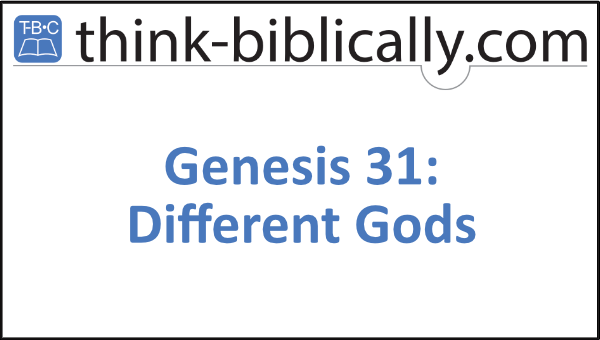By Tyson Thorne

My senior year of high school I worked as a student assistant for the Chemistry department. One day I was having a discussion with one of the teachers about his beliefs. Knowing I was a Christian, he told me that he too believed in God and that God used the process of evolution as a means of creation. I explained that his belief is in a God that used death – survival of the fittest – to create the world while I believe in a God who created a world without death and suffering. I concluded saying, “It sounds to me like we worship different Gods.”
A similar discussion occurred thousands of years ago and is recorded in Genesis chapter 31, proving that humanity has changed little over the course of its existence. In this passage we learn that Laban’s heart has turned against Jacob, and God instructed Jacob to leave silently and return to his father’s land. While making ready their departure we get the first clue about the main difference between Jacob and his uncle. In verse 19 we see that Rachel steals Laban’s household idols. They get underway, and a week later Laban and his men catch up to Jacob.
Laban is rightly angry that Jacob left without saying goodbye. He argues that he would have sent Jacob off in a worthy manner and should have had the opportunity to kiss his daughters and grandchildren goodbye. He lets slip his true intentions, however, in verse 29: “I have the power to do you harm, but the God of your father told me last night [not to harm you].”
After their argument, Laban wants to make an agreement, a pact for peace between them. So they build standing stones to separate their lands, each of them agreeing to never pass them with evil intent. The arbiter of their agreement is God, most translations stating that elohim would “judge between us.” The NET Bible does a better job understanding the Hebrew here, making it clear that it would not be the true God who would be judge, but the God of Isaac and the god Nahor. What is less clear is Jacob’s resistance to equating the two, God and Nahor. Verse 53 makes it clear he did not want Nahor being part of the agreement, saying, “Jacob took an oath by the God whom his father Isaac feared.”
This story is more than a dispute between relatives, it is a theological duel. Like my teacher and I, Jacob recognized that his God was not the same as Laban’s. Jacob knew of his father’s experience with Yahwey and remembered his own struggle with the Angel of the Lord years earlier. He decided to stay true to the one God above all gods.
We meet people every day who claim to believe in God, but do they really? It is important to ask questions that reveal the reality behind their beliefs. Today it is just as important to know who to trust, and whom to run from. A decade after high school I was working at a print shop and a couple men came in wanting to publish some curriculum. They claimed to be “Christians”, but the shop was located very near a Morman temple, so I asked them, “What do you mean by ‘Christian’?” They said, “We trust in Jesus alone by faith alone for our salvation.” It turned out they were brothers in Christ after all.
A lot of groups use Christian terminology to express beliefs that are other than God’s teachings. Be wise as a serpent and ask good questions so you are not taken in or deceived.
|
|
